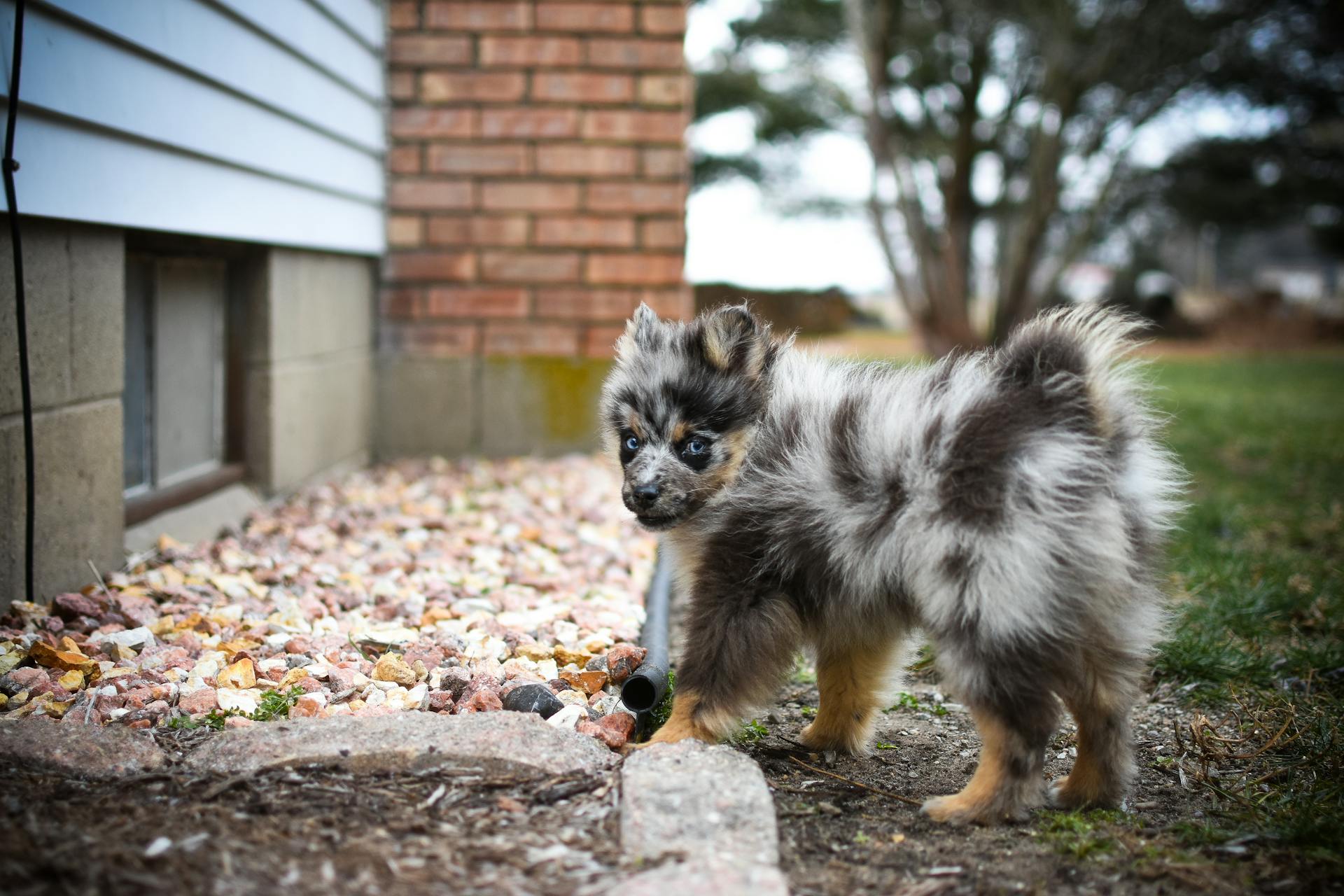
Beagles are friendly, curious, and energetic dogs that make great companions for families and hunters alike. They are small to medium-sized, typically weighing between 18-30 pounds and standing between 10-15 inches tall.
Beagles are known for their distinctive baying howl, which they use to communicate with their human family and other dogs. This unique sound is a result of their breeding history as hunting dogs.
Beagles are relatively easy to care for, requiring daily walks and playtime to keep them happy and healthy. They need regular exercise to prevent boredom and destructive behavior.
To keep your Beagle happy and healthy, it's essential to provide them with a balanced diet and plenty of fresh water. A high-quality dog food that meets their nutritional needs is a great starting point.
See what others are reading: A Guide to Managing Healthy Weight in Your Dog This Summer
Breed Characteristics
Beagles are known for their friendly and gentle nature, making them a great addition to many families. They are also playful and curious, which can sometimes get them into mischief.
Beagles are relatively small dogs, with adults typically reaching 13-15 inches in height and weighing between 20-30 pounds. The Pocket Beagle is a smaller variant, weighing in at 7-15 pounds.
Here are some key characteristics of Beagles at a glance:
- Origin: England
- Lifespan: 10-15 years
- Breed Group: Hound
- Grooming needs: Low; requires weekly brushing
- Health concerns: Hip dysplasia, elbow dysplasia, eye problems, allergies
Size
Beagles come in a few different sizes, which can affect their overall weight and appearance. The American Kennel Club recognizes two main varieties based on height: the 13-inch and 15-inch varieties.
The 13-inch variety is for Beagles that don't exceed 13 inches in shoulder height, while the 15-inch variety is for Beagles that stand between 13 and 15 inches tall at the shoulder. This size difference can impact their weight, with Beagles weighing anywhere from 18 to 30 pounds.
Beagles typically weigh between 20-30 pounds, depending on their size. The Pocket Beagle is a slightly smaller version, weighing between 7-15 pounds.
Curious to learn more? Check out: Size of Beagle Dogs
Fun Facts
Beagles are known for their loving and energetic personalities, but did you know that they have some unique characteristics that set them apart from other breeds?
Beagles tend to be more food obsessed than many other breeds, which can make them prone to obesity if not managed properly.
If you're thinking of getting a Beagle, it's worth noting that the majority of owners name their male Beagles Cooper, with Charlie being a close second. Female Beagles are often named Bella or Daisy.
Beagles are also known for their strong sense of smell and love of work. In fact, they're even employed as airport security's "Beagle Brigade" to sniff out potential threats.
If this caught your attention, see: Beagles Good Guard Dogs
Appearance
The Beagle's appearance is quite distinctive, with a short, smooth coat that's traditionally tri-colored with a black saddle, tan head and legs, and white chest and muzzle.
They can also come in other variations, such as red and white or lemon and white.
The American Kennel Club (AKC) breed standard only accepts solid colors, but in reality, there are 25 possible color combinations for the Beagle.
A common coat pattern for the Beagle is tri-color, making up 32% of their coats according to FidoTabby Alert's database.
For another approach, see: Shiba Inu Coat
Breeds Similar to

If you're considering a beagle, but not sure if it's the right fit for you, there are several other breeds worth exploring. Here are a few similar breeds to get you started.
Foxhounds are great family dogs with low maintenance, short hair, and a friendly disposition. They're medium-sized and high-energy, bred to hunt foxes.
Harriers are often referred to as "beagles on steroids" due to their similar appearance and temperament. They're high-energy, but gentle, and roughly double the weight of a standard beagle.
Basset hounds are natural hunters, affectionate, gentle, and social. They require a more moderate amount of exercise compared to some other breeds.
If you're looking for a breed similar to the beagle, here are a few options to consider:
- Foxhound
- Harrier
- Basset hound
What Are Scent Hounds?
Scent hounds are a special category of dogs that use their incredible sense of smell to track things. They'll follow their nose anywhere it leads, and often forget about everything else in the process.
Beagles, for example, are known for their strong sense of smell and are often used for hunting rabbits. They're also employed in airport security as part of the "Beagle Brigade."
Scent hounds are not just good at tracking scents, but they can also be prone to getting distracted by food. Beagles, in particular, tend to be more food obsessed than many other breeds, which can lead to obesity if not managed properly.
If you're considering getting a scent hound as a pet, be prepared for a lot of sniffing and exploring. They'll need regular exercise and mental stimulation to keep them happy and healthy.
Here are some popular names for male and female Beagles, based on PetScreening's 2024 database:
Health and Care
Beagles are generally healthy dogs, but like all breeds, they can be prone to certain health issues. Hip dysplasia is a common condition that can cause pain and lameness, and it's essential to have your Beagle's parents tested for this condition before bringing a puppy home.
Hip dysplasia is often inherited, so it's crucial to choose a reputable breeder who provides health clearances for both parents. A hip X-ray or MRI may be required to diagnose this condition, and it can be managed with anti-inflammatory medication or surgery.
Beagles are also prone to hypothyroidism, a condition where the thyroid gland doesn't produce enough hormones. This can cause weight gain, lethargy, and skin problems, but it's treatable with medication.
Epilepsy is another condition that can affect Beagles, causing seizures that can be distressing for owners. However, with proper management and medication, most dogs can lead normal lives.
Regular exercise and a balanced diet are essential to keep your Beagle healthy and happy. Beagles need daily walks and playtime, and they should be prevented from becoming lazy and overweight.
Here are some common health issues that can affect Beagles:
- Hip dysplasia
- Hypothyroidism
- Epilepsy
- Cherry eye
- Patellar luxation
- Intervertebral disc disease
- Abscesses
It's also essential to keep your Beagle's coat clean and well-groomed. They require regular brushing or combing to remove dead hair, and they should be bathed regularly to prevent skin infections.
Microchipping is crucial to ensure your Beagle can be identified and returned if they ever get lost. It's also a good idea to keep your Beagle on a leash in open areas, as they can be prone to wandering off if they catch a scent.
Grooming and Nutrition
Grooming and Nutrition are essential aspects of caring for your Beagle. Brush your dog's short coat weekly with a quality bristle brush to stimulate hair growth and release dead hair.
Beagles have a dense double coat that sheds moderately throughout the year, so regular brushing is a must. You should also inspect those floppy ears for signs of infection and to keep them clean.
Bathing your Beagle once a month is recommended to wash away any built-up odor. Don't neglect your pooch's pearly whites – dogs get gum disease five times more than humans, so brushing three times per week is crucial.
You might enjoy: Dogs Hair Standing up and Tail Wagging
Grooming
Beagles have a dense double coat that sheds in the spring, so be prepared for some moderate shedding throughout the year. Brush your dog's short coat weekly with a quality bristle brush to stimulate hair growth and release dead hair.
Brushing your beagle's coat weekly is essential to prevent matting and tangling. A beagle's coat naturally repels dirt, but bathing once a month is recommended to wash away any built-up odor.
Keep your beagle's nails clipped down with the proper clippers or grinder to prevent overgrowth. You should also inspect those floppy ears for signs of infection and to keep them clean.
Dogs get gum disease five times more than humans, so brushing your beagle's teeth three times per week is a must. Talk with your vet about safe dental water additives to further protect against periodontal issues.
Diet and Nutrition
Feeding your beagle high-quality, nutrient-dense food twice daily is essential for their health and well-being.
As a breed, beagles don't have special dietary requirements, but it's crucial to talk with your vet about portioning for your fur baby.
An adult beagle should have roughly 1.5 to 2 cups of food daily, split into two meal times.
Beagles are prone to obesity, which can damage their health, so it's essential to keep an eye on their food intake.
Many beagles are food-motivated and "always hungry", but this is not necessarily their fault - it's in their DNA as hunting dogs.
For your interest: Dental Health Diets for Dogs
Training and Behavior
Beagles are friendly dogs who love spending time with others, including dogs and humans. They thrive on social interaction and should be exposed to new dogs, people, places, and situations from an early age.
Early socialization is crucial for Beagles, and it's essential to teach them what is OK to chew and what's not. Puppies love to chew everything, especially when they're teething, so it's vital to provide them with suitable chew toys and teach them the "Leave It!" command.
Beagles can be stubborn and need a lot of attention, which is why consistent training and repetition are key. Crate training and potty training are also essential components to a happy dog, and with patience and understanding, you can help your Beagle become a well-adjusted adult.
A fresh viewpoint: Can Dogs Chew on Water Bottles
Temperament
Beagles are known for their friendly and outgoing nature, making them great companions for people of all ages. They're amiable and seldom squabble with other dogs or pets, making them a great addition to families with multiple animals.
For more insights, see: Dogs Getting Sick from Dog Food
Beagles are naturally curious and love to explore their surroundings, which can sometimes lead to mischief if left unattended. This is why early socialization is crucial for Beagles, exposing them to diverse people, sights, sounds, and experiences during their youth helps ensure they grow into well-rounded and balanced adults.
Beagles are prone to barking, especially when untrained or lonely, but they're not good guard dogs as they commonly act friendly, even toward strangers. They're also known to become destructive if left alone too long, so it's essential to provide them with plenty of attention and exercise.
Beagles are pack animals and may even come to see the neighborhood cat as one of their own, but it's essential to remember their natural instincts as hunting dogs with strong prey drive. This means they may instinctively chase other animals that they perceive as prey.
Beagles are great with children of all ages, but families with small children should consider the workload required to train a beagle puppy, as they can be quite stubborn and need a lot of attention.
You might enjoy: Can Dachshunds Be Left Alone
Trainability
Beagles can be a bit stubborn when it comes to training, and it's essential to remember that they were bred for endurance and persistence. This means they might not always listen to commands, especially if they're not properly socialized.
Beagles are pack animals and may even come to see other animals as part of their pack, which can sometimes lead to chasing or barking at them. However, with proper training and socialization, they can learn to get along with other pets.
Beagles are known to be friendly and outgoing, but they can also be prone to destructive behavior if left alone for too long. This is why it's crucial to establish clear boundaries and teach them what is and isn't allowed.
Beagles are intelligent dogs, but they can be easily distracted, which can make training a bit more challenging. Consistency and positive reinforcement are key when training a Beagle.
Beagles are great with children of all ages, but families with small kids should consider the workload required to train a Beagle puppy, as they can be quite stubborn and need a lot of attention.
A different take: My Dog Bit the Amazon Delivery Person
Are Loud?
Beagles are naturally noisy, and their barking and howling can be quite common. This is because they use their voice to communicate more than most other breeds.
A beagle may bark or howl to share their exciting new discovery with you, which can be a fun but also potentially loud experience. Adequate exercise can help with pent-up energy that can result in more barking.
Here's an interesting read: Dog Barking at Other Dogs While Walking
Family and Lifestyle
Beagles are a great fit for families with small children, as they're gentle and small enough to be a great choice. With proper training, they're happy to adapt to a household with kids of all ages.
Beagles are loyal to their pack and love to share the love equally, making them a great addition to families with multiple members. They're happy to be adored by all, so be prepared for lots of snuggles and attention.
Beagles need to be contained or restrained due to their strong hunting instincts and incredible sense of smell. This means they should always be on a leash when outside, but they still need plenty of exercise with their family.
With their sensitive noses, beagles can get distracted by even the smallest smells, so it's essential to keep them contained. This doesn't mean they won't enjoy spending time with their family, though - just be prepared for the occasional sniffing detour.
You might enjoy: Wellness Dog Food for Small Dogs
Exercise
Beagles are adaptable family dogs that do just fine in almost any environment, including an apartment, as long as they get adequate physical and mental stimulation. They need plenty of exercise and attention to keep this high-energy breed healthy and happy.
Aim for a long walk or two brisk walks daily and lots of playtimes. Beagles need outdoor time to explore with their nose, expel energy, and don't do well being crated for long periods.
Beagles don't like to be alone and may become destructive if they're not getting enough attention. Pet parents away from home for eight hours a day or more should know this.
They'll do well as a family dog, with other animals, and as the "only child" lavished with love. Just remember, any performance event, play-time, or special training exercise you work on together makes the bond between you special.
A Beagle should always be contained or restrained, never allowing them to run free. Their nose is so sensitive that Beagles are often distracted by it, and will come to their senses blocks away.
Take a look at this: When Do Dogs Lose Puppy Energy
Puppy Care
Beagle puppies are full of energy and curiosity, and they need plenty of attention and exercise to keep them happy and healthy. They should know how to learn and listen by 6 months old.
Microchipping is essential for Beagles, as they have a natural tendency to wander and may try to escape. A microchip can ensure a swift return if they do get out.
Beagles are highly motivated by treats, making them eager to learn and obey commands. Positive reinforcement techniques, such as treats, work best for Beagles.
Beagles are prone to obesity, so regular exercise and a balanced diet are crucial to keep them healthy and happy. They need a fenced yard and either vigorous game time or a long leash walk daily.
Beagles are relatively low-maintenance, but they do require a weekly or twice-weekly brushing or combing to remove dead hair, especially during shedding season.
Take a look at this: Shiba Inu Exercise Needs
Frequently Asked Questions
What do beagles love the most?
Beagles love affection and company, making them a great fit for families and households with multiple pets. They thrive on interaction and attention from their loved ones.
What are 10 facts about beagles?
Beagles were originally bred for hunting, come in two sizes, and have distinctive characteristics like floppy ears, vocalizations, and wagging tails. From hunting to detection, beagles have been employed in various roles, showcasing their intelligence and versatility.
Featured Images: pexels.com


